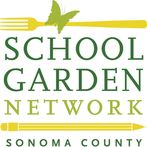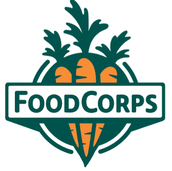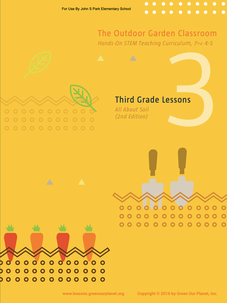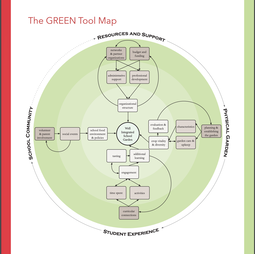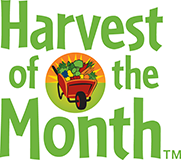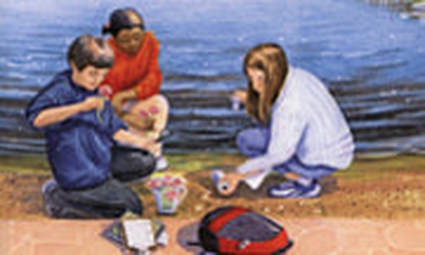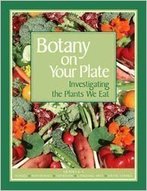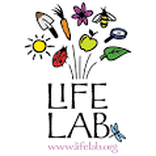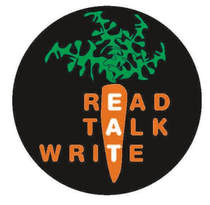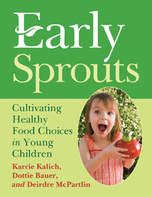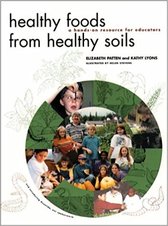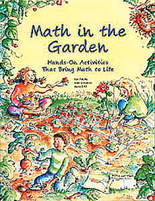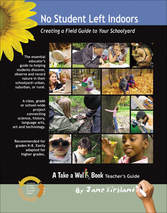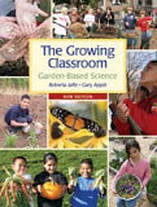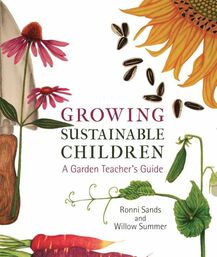Learning in the garden K-5
VIDEOS:
Krista Gasper creates videos on YouTube about composting, eating local, soil nutrients and so much more! Krista is the garden educator at Harmony School. Her lessons are separated into K-3rd grade and 4th-8th grade. Check out her channel!
Marin Child Care Council has created dozens of short youtube videos targeted to preschool teachers who wish to incorporate gardening into their curriculum. Their mission is to "is to improve availability, accessibility, and affordability of quality child care in Marin County."
ONLINE and PDF's:
|
FoodCorps Resources to Support Remote Education has adapted their creative hands on lessons to be taught at home to ages 5-11 years old. A collection of Video Lesson by FoodCorps AmeriCorps Service Members can be found here.
|
|
Green Our Planet hired a group of horticulturists and a team of teachers from the Clark County School District to create a STEAM (science, technology, engineering, art, and math) curriculum geared toward the school garden. The curriculum(PDF) follows Nevada State and Next Generation Science Standards and was published online in September 2014. The Garden STEAM curriculum engages students’ curiosity and creates excitement around science and math through hands-on experiential learning in school gardens.
|
|
Junior Master Gardeners is an amazing resource of featuring "Virtual Learn, Grow, Eat and Go! Online Course for Elementary Students." The International Junior Master Gardener Program also brings additional circulcum materials, certification options and checklists to help prepare teachers and leaders to engage students.
|
|
The GREEN Tool (WEB) (PDF) research outlines the four main domain areas of a well-integrated school garden based on research from 21 school sites in the New York City area.
If you are looking to start your school garden or simply improve systems of integration of your existing garden to the school, this resource will provide helpful guidance on your path. Not only does it identify key components necessary to ensuring the sustainability of a wide diversity of school garden programs but it goes a step further to offer a sequence schools can follow for the implementation of these components to benefit the whole. |
|
Harvest of the Month - Each month CAFF purchases produce from local growers, packs the produce items into educational kits, and works with a local distributor to deliver the kits to participating schools and classrooms. This model enables teachers to take the lead on food and farming education and allows kids to taste fresh, local fruits and vegetables while learning about the farmers who grew them, empowering them to make healthy choices. HOTM is a perfect segue into more robust Farm to School programs that link the cafeteria to the classroom, because it allows both educators and food service staff to focus on one local seasonal produce item a month.
|
|
This Nature Journaling curriculum will become a go-to resource for your school garden program. Whether you are a school garden teacher or classroom teacher this curriculum provides students, K-12, with incredibly simply, yet in depth opportunities to learn from nature through close observation. Each activities can be adapted across the grade levels.
|
BOOKS:
|
Acorn Naturalists- a fantastic collection science and environmental education supplies for teachers, outdoor educators, schools, educators, entomologists, trackers, storytellers, parents and their children.
|
|
Botany on Your Plate-Investigating the Foods We Eat- this investigative science curriculum introduces the world of plants through foods we eat. Children explore edible roots, stems, leaves, flowers, fruits, and seeds through observation, dissection, journaling, discussion of findings, and, of course, tasting!
|
|
Eat-Read-Talk-Write The School Garden Doctor promotes evidence-based practices to sustain school gardens. Check out this classroom-tested approach to developing food literacy in the classroom, kitchen, and garden. This pedagogical approach begins with a shared food experience that sets context for literacy and science lessons. The cycle can be extended to include Planting-Growing-Harvesting activities in the school garden. Lessons connect to food literacy themes and align to Common Core State Standards for ELA/Literacy and Next Generation Science Standards.
|
|
EARLY SPROUTS, Cultivating Healthy Food Choices in Young Children www.earlysprouts.org - Creative, research-based nutrition curriculum with a seed-to-table approach. Encourages preschoolers to eat more vegetables by helping grow, harvest, and prepare organically grown foods. Includes information for planning, planting, and maintaining a garden that works with a variety of climates.
|
|
Healthy Foods From Healthy Soils: A Hands-On Resource For Teachers- invites you and your students to discover where food comes from, how our bodies use food, and what happens to food waste. You’ll participate in the ecological cycle of food production > compost formation > recycling back to the soil, while helping children understand how their food choices affect not only their own health, but farmers, the environment, and your local community
|
|
NO Student Left Indoors -Nature is not a destination, it is everywhere — including right in your own schoolyard! This essential educator’s guide helps students discover, observe, and record nature in their urban, suburban, or rural schoolyard. A wonderful multidisciplinary hands-on project that teaches children to learn to appreciate nature…and find it in the most unexpected places.
|
|
Opening the World Through Nature Journaling by John Muir Laws. A free download that includes great kid tested sketching activities, poetry writing, and more detailed tips on drawing in nature (you will love the material on drawing plants). This is a great resource for teachers, outdoor leaders, and home school parents.
|
|
Schoolyard-Enhanced Learning -shows how the school grounds—regardless of whether your school is in an urban, suburban, or rural setting—can become an enriching extension of the classroom. In this comprehensive handbook, Herb Broda blends theory and practice, providing readers with practical suggestions and teacher-tested activities for using the most powerful audio-visual tool available—the outdoors.
|
|
The Growing Classroom This foundational year-round gardening curriculum is a teacher and NGA staff favorite! Developed by the Life Lab Science Program and revised to meet current science standards, this renowned teacher’s manual features strategies for managing garden-based science instruction — including planning a garden laboratory, facilitating investigative lessons on ecology and nutrition, and involving the community.
|
|
Growing Sustainable Children offers "useful overviews of the history of gardening education and the evolving consciousness of children through its detailed age-appropriate curriculum and activity listings from nursery and kindergarten through high school. This book will be an indispensable resource for anyone already teaching in a gardening program, for those planning on starting such a program, or for anyone working with children in a garden or other outdoor setting as a homeschooler, community organizer, or friend of the Earth."
|
